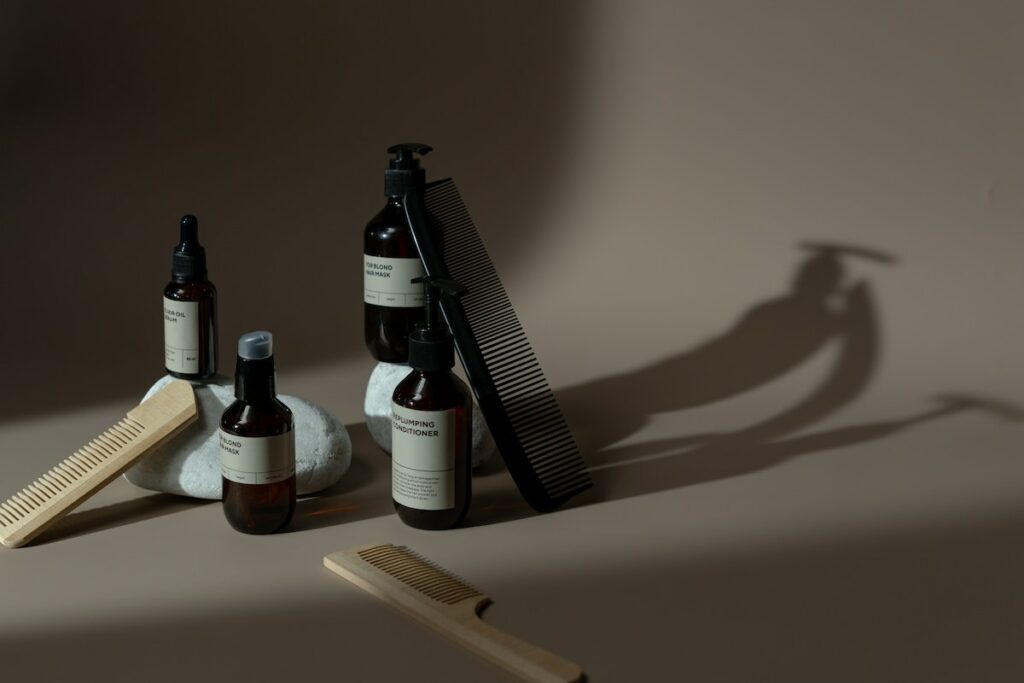The hair care industry has witnessed an unprecedented surge in popularity, with a staggering revenue of $91.23 billion in 2023 alone. Among the myriad hair care products available, surveys indicate that 52% of U.S. consumers lean towards natural or organic options, recognizing the importance of using gentle yet effective products.
In this ever-expanding market of hair care solutions, one particular gem stands out – tea tree shampoo. Renowned for its remarkable benefits, tea tree shampoo has garnered a devoted following. Its natural essence promotes a healthy scalp, revitalizes hair follicles, and nourishes strands, leading to lustrous locks. Dive into the enriching world of tea tree shampoo benefits and uncover the wonders it holds for your haircare regimen.

What is Tea Tree Shampoo?
Tea tree shampoo is a specialized hair care product that harnesses the power of tea tree oil as its primary ingredient. Derived from the leaves of the tree Melaleuca alternifolia, it has been used for centuries for its medicinal and therapeutic properties. When used in shampoo, it offers unique benefits that set it apart from regular shampoos.
One key difference lies in its cleansing properties. While regular shampoos primarily focus on removing dirt and excess oil from the scalp, tea tree shampoo goes further. It possesses natural antiseptic and antimicrobial properties that help combat scalp issues such as dandruff, itchiness, and flakiness. Its ability to deeply cleanse the scalp without stripping away natural oils makes it a preferred choice for those with oily or sensitive scalps.
The key ingredients in tea tree shampoo, besides tea tree oil, often include a blend of natural botanical extracts and essential oils. These ingredients work synergistically to enhance the overall effectiveness of the shampoo. Common additions may include soothing aloe vera, invigorating peppermint oil, nourishing jojoba oil, and moisturizing coconut oil. These components contribute to a balanced formula that cleanses the scalp and promotes a healthier environment for hair growth.
Moreover, tea tree shampoo is often free from harsh chemicals such as sulfates, parabens, and artificial fragrances, making it a preferred option for individuals seeking more natural and gentle hair care products. Its delicate nature makes it suitable for various hair types, including dry, oily, and even color-treated hair.
Ingredients Usage In Tea Tree Shampoo
Tea tree shampoo utilizes a range of specific ingredients known for their remarkable properties and benefits for hair and scalp health. The following are ingredients commonly found in tea tree shampoo and how they contribute to its effectiveness.
Tea Tree Oil
The star ingredient, tea tree oil, is known for its powerful antiseptic, antibacterial, and antifungal properties. It helps combat common scalp issues like dandruff, itchiness, and dryness. Tea tree oil also helps regulate sebum production, promoting a balanced scalp environment and preventing excessive oiliness.
Botanical Extracts
Many tea tree shampoos contain botanical extracts like aloe vera, chamomile, lavender, and rosemary. Aloe vera soothes the scalp, reduces inflammation, and provides moisture to the hair. Chamomile has calming properties, promoting scalp health and relieving irritation. Lavender helps balance oil production, and rosemary stimulates hair follicles, encouraging healthy hair growth.
Peppermint Oil
Peppermint oil adds a refreshing and invigorating element to tea tree shampoo. It helps stimulate blood circulation in the scalp, promoting hair follicle health and encouraging hair growth. Peppermint oil also imparts a cooling sensation, soothing an itchy scalp and providing a refreshing cleansing experience.
Jojoba Oil
Jojoba oil is a lightweight and non-greasy oil that closely mimics the natural oils produced by the scalp. It helps moisturize and condition the hair without weighing it down. Jojoba oil also nourishes the scalp, promoting a healthy environment for hair growth and reducing dryness and flakiness.

Coconut Oil
Coconut oil is known for its moisturizing and conditioning properties. It helps hydrate and soften the hair, reducing frizz and improving manageability. Coconut oil also contains lauric acid, which has antimicrobial properties that can help combat scalp infections and promote a healthier scalp.
How does Tea Tree Shampoo work?
Tea tree shampoo uses several mechanisms to address common hair and scalp issues, owing to its unique properties and ingredients. Here’s how tea tree shampoo promotes a healthier scalp and hair.
Cleansing and Clarifying
Tea tree shampoo is highly effective in cleansing the scalp and hair. Its natural surfactants help remove dirt, excess oil, and product buildup, leaving the scalp and hair feeling fresh and revitalized. Unlike regular shampoos, tea tree shampoo’s cleansing action goes beyond the surface, penetrating deep into the hair follicles and pores to remove impurities. This deep cleansing action helps unclog hair follicles, allowing for better hair growth and reducing the likelihood of scalp issues.
Antimicrobial and Antifungal Properties
Tea tree oil, the key ingredient in tea tree shampoo, possesses potent antimicrobial and antifungal properties. It helps combat various microorganisms, including bacteria, fungi, and yeasts, that can contribute to scalp issues like dandruff, itching, and flakiness. Tea tree oil’s antimicrobial action helps control the overgrowth of these microorganisms, promoting a healthier scalp environment.
Scalp Soothing and Anti-Inflammatory Effects
Tea tree shampoo offers soothing benefits for the scalp. It can help reduce scalp inflammation, irritation, and itching, providing relief to those experiencing discomfort. The combination of tea tree oil and other botanical extracts like aloe vera, chamomile, and lavender work synergistically to calm and soothe the scalp, helping to alleviate common scalp issues.
Balancing Sebum Production
Tea tree shampoo helps balance sebum production in the scalp. Sebum is the natural oil produced by the scalp to moisturize and protect the hair. An imbalance in sebum production can lead to oily or dry scalp conditions. Tea tree shampoo helps regulate sebum production, preventing excessive oiliness or dryness and promoting a balanced scalp environment.
Gentle and Nourishing
Tea tree shampoo is often formulated with gentle ingredients that nourish and moisturize the hair and scalp. Essential oils like jojoba and coconut oil provide hydration and conditioning to the hair, improving its overall health and appearance. These nourishing ingredients help restore moisture balance, reduce dryness, and enhance the vitality of the hair.
How to use Tea Tree Shampoo?
To achieve optimal results with tea tree shampoo, it is important to follow the proper usage guidelines. Here are step-by-step instructions on how to use tea tree shampoo effectively:
- Wet Your Hair: Start by thoroughly wetting your hair with warm water. Make sure your hair is completely saturated from roots to ends.
- Apply Tea Tree Shampoo: Take a small amount of tea tree shampoo and gently massage it into your scalp. Focus on the roots and work the shampoo through your hair, creating a rich lather. Ensure that the shampoo reaches all areas of your scalp and hair.
- Massage and Cleanse: Using your fingertips, massage your scalp in gentle circular motions for a few minutes. This stimulates blood circulation, helps to loosen any debris or buildup, and allows the shampoo to penetrate deeply into the hair follicles. Continue massaging and cleansing your hair for a thorough cleanse.
- Rinse Thoroughly: Rinse your hair with warm water until all the shampoo is completely washed out. Make sure to rinse the hair and scalp thoroughly to remove any residue.
- Follow with Conditioner (Optional): Depending on your hair type and preference, you may choose to follow the tea tree shampoo with a conditioner. Apply conditioner to the lengths and ends of your hair, avoiding the scalp. Leave it on for the recommended time and rinse thoroughly.
- Repeat if Desired: If you feel the need for a second round of cleansing, you can repeat the shampooing process. However, for most people, a single wash is sufficient.
- Pat Dry and Style: After rinsing, gently squeeze out excess water from your hair. Pat your hair dry with a towel or allow it to air dry. Proceed with your preferred styling routine.
Frequency of Use
The frequency of using tea tree shampoo depends on individual factors such as hair type, scalp condition, and personal preference. As a general guideline, tea tree shampoo 2-3 times a week is often recommended. However, if you have a particularly oily scalp or persistent scalp issues, you may use it more frequently. It’s essential to listen to your hair and scalp’s needs and adjust the frequency accordingly.
Remember, a little goes a long way with tea tree shampoo, so start with a small amount and gradually increase if needed. Overusing the shampoo can lead to dryness, so finding the right balance for your hair and scalp is important.

10 Amazing Benefits Of Tea Tree Shampoo
Tea tree shampoo offers a multitude of amazing benefits for the hair and scalp. From treating dandruff to nourishing the hair, it serves as a versatile solution for various hair concerns.
Effectively treating dandruff and dry scalp.
Tea tree shampoo’s antifungal and antiseptic properties help combat dandruff and alleviate dry scalp conditions. It helps reduce flakes and itchiness, promoting a healthier scalp.
Soothing scalp irritation and itchiness.
The soothing properties of tea tree oil in the shampoo help calm and relieve scalp irritation and itchiness caused by various factors, including sensitivity or inflammation.
Promoting hair growth and reducing hair loss.
Tea tree shampoo stimulates blood circulation in the scalp, promoting hair follicle health and encouraging hair growth. It can also help reduce hair loss by creating a healthy environment for hair to thrive.
Balancing oil production and managing oily scalp.
Tea tree shampoo helps regulate sebum production, preventing excessive oiliness and managing an oily scalp. It cleanses the scalp without stripping away natural oils, providing a balanced environment for the hair.
Nourishing and moisturizing the hair.
With the inclusion of nourishing ingredients like botanical extracts and essential oils, tea tree shampoo deeply nourishes and moisturizes the hair, leaving it soft, smooth, and hydrated.
Preventing bacterial or fungal infections on the scalp.
Tea tree oil’s antimicrobial properties make it effective in preventing bacterial or fungal infections that can lead to scalp issues like folliculitis or scalp acne.
Adding shine and improving the overall appearance of the hair.
Tea tree shampoo helps remove impurities and product buildup, enhancing the hair’s natural shine and improving its overall appearance.
Reducing scalp inflammation and sensitivity.
The anti-inflammatory properties of tea tree oil help reduce scalp inflammation and sensitivity, providing relief for those experiencing discomfort.
Removing product buildup and impurities.
Tea tree shampoo’s cleansing action effectively removes product residue, excess oil, and environmental impurities from the hair and scalp, ensuring a clean and refreshed feel.
Enhancing the natural fragrance of the hair.
Tea tree shampoo imparts a refreshing and invigorating fragrance to the hair, leaving it subtly scented with its natural aroma.
Tea tree shampoo offers a wide range of benefits that make it a natural and effective solution for diverse hair and scalp concerns. From treating dandruff and soothing irritation to promoting hair growth and balancing oil production, it addresses these issues while nourishing and improving the overall appearance of the hair. Consider incorporating tea tree shampoo into your hair care routine to unlock healthier, more manageable hair and experience the transformative power of nature’s elixir for your tresses.
Frequently Asked Questions
Can tea tree shampoo help with dandruff and dry scalp?
Yes, tea tree shampoo can help with dandruff and dry scalp due to its antifungal and soothing properties.
Does tea tree shampoo have antifungal and antibacterial properties?
Yes, tea tree shampoo can help with dandruff and dry scalp due to its antifungal and soothing properties.
Is tea tree shampoo suitable for all hair types?
Thanks to its balancing and gentle nature, tea tree shampoo is suitable for most hair types, including oily, dry, and normal hair.
Can tea tree shampoo help with itching or irritation on the scalp?
Tea tree shampoo can help relieve itching and scalp irritation due to its soothing and anti-inflammatory effects.
How often should tea tree shampoo be used for optimal results?
For optimal results, tea tree shampoo can be used 2-3 times a week, but the frequency may vary based on individual needs and preferences.




